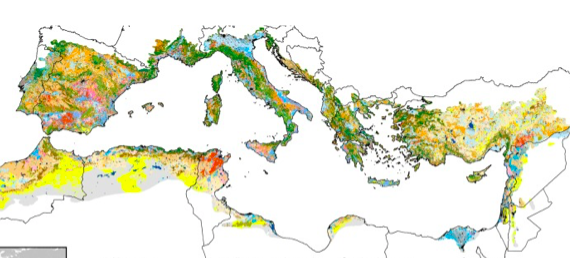
Malek Z, Verburg PH, Geijzendorffer IR, Bondeau A, Cramer W (2018) Global change effects on land management in the Mediterranean region. Global Environmental Change, 50, 238-254
Highlights
- We present land change scenarios for the Mediterranean driven by global change.
- Yield improvements influence the expansion of rainfed and irrigated cropland.
- Limiting water resources significantly affects modeling land system change.
- Improving the state of water resources while increasing food production is possible.
- Expanding the network of protected areas does not impact food production.
Abstract
The Mediterranean region faces significant challenges to supply its growing population with food and living space. The region’s potential to do so in the future is even more uncertain in the light of global change effects. Climate change will impact water availability in the region, which is already limited and often used at unsustainable rates. To investigate the effects of global change and explore alternative development pathways of Mediterranean land use, we simulated two future scenarios with different land, water and biodiversity management transitions. We adopted a land systems approach, where land use and land cover are combined with data on land management, irrigation and livestock density, taking into account the characteristics of Mediterranean multifunctional landscapes, specific agricultural products, such as permanent crops, and irrigation water demands. Future land system changes were explored using the CLUMondo model for different development pathways of the region. We constrained the withdrawal of irrigation water based on existing freshwater resources. In a ‘growth’ scenario, we simulated a hypothetical future without consideration of environmental constraints and where food production and urban expansion are main priorities. The ‘sustainability’ scenario represents a future where limited water resources are extracted in a sustainable way and where areas of high biodiversity value are protected. The growth scenario projected significant intensification of land management, and loss of agro-silvo-pastoral mosaic systems. To achieve this, we calculate that the region would need to increase water withdrawal for irrigation significantly, resulting in increased pressure on freshwater resources. The sustainability scenario presents a way of increasing food production and at the same time improving the state of water resources, wetlands and traditional landscapes. Achieving this future would require improvements of yields of rain-fed systems and efficiencies of irrigated systems. The results indicate that coordinated environmental policy together with appropriate market access are needed to steer the regions land management towards a more sustainable future while ensuring food production.
